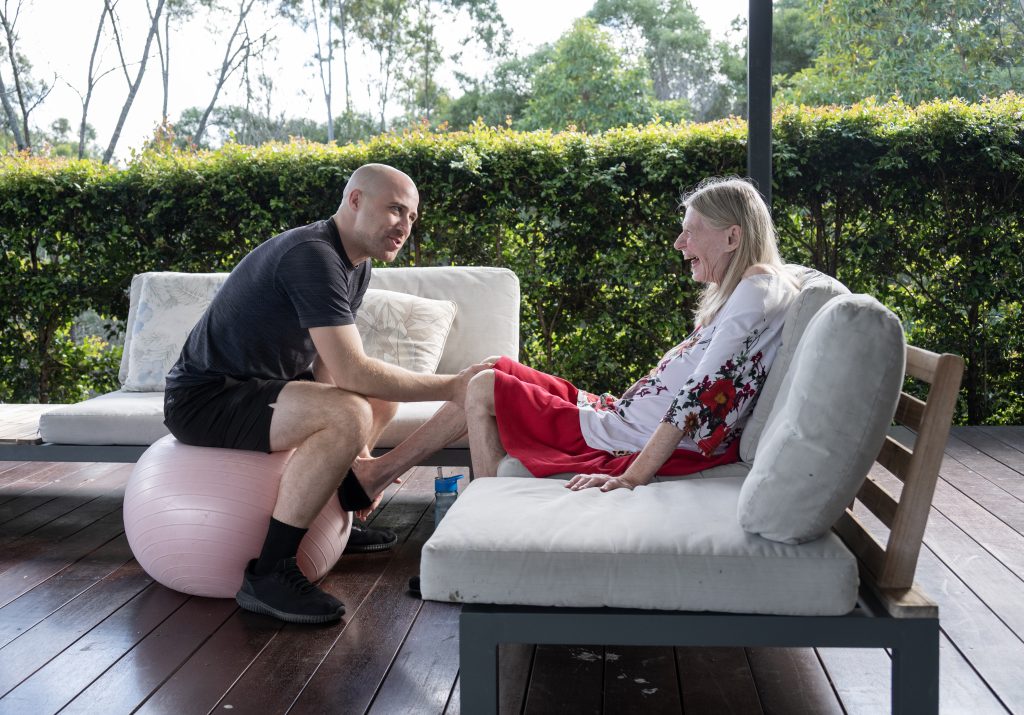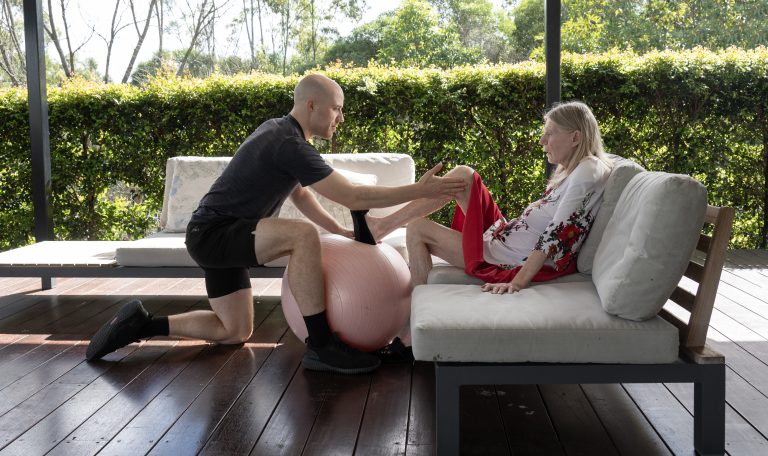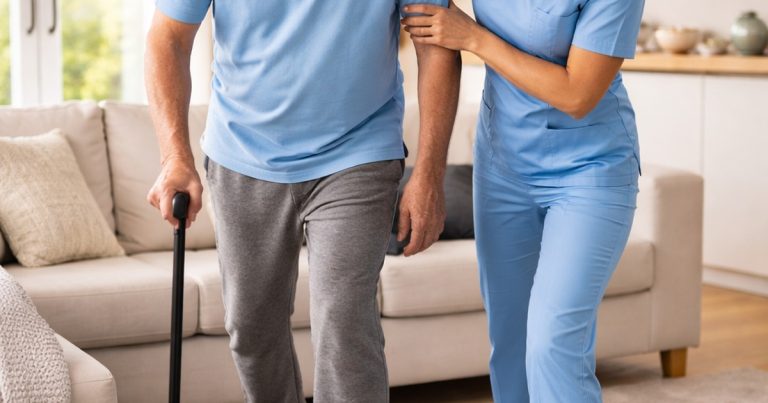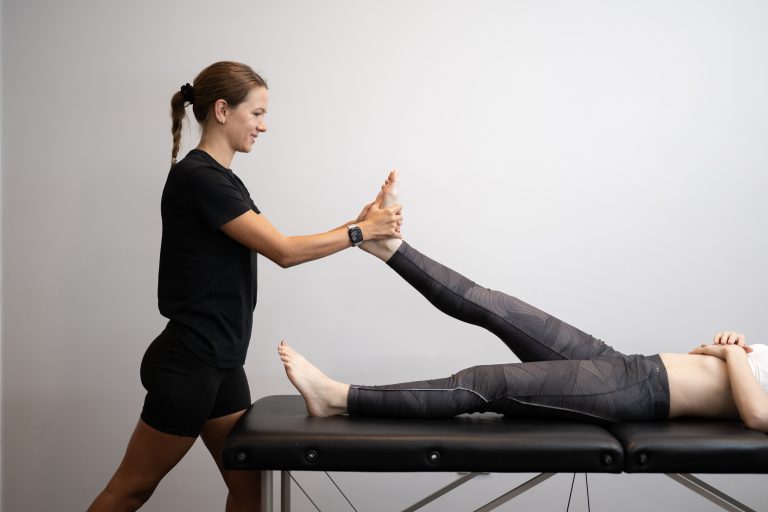Strokes can be incredibly scary medical episodes, both for the person suffering it and their loved ones. About 8-10% of strokes are fatal, while the other 90% often leave sufferers with physical, cognitive and emotional changes. Fortunately, these can often be reversed or improved with proper care and rehabilitation.
Stroke rehabilitation will look different for everyone, and will largely depend on the type and seriousness of the stroke, as well as the effects it’s had on the body. But it will also likely involve multiple services, including physiotherapy.
In this blog we’ll take a look at how strokes can physically impact those who suffer from them, what recovery might look like (including services and timelines), and the important role physiotherapy plays.
What Are The Physical Impacts of a Stroke?
Strokes are caused by a disruption of blood flow to the brain, which deprives the brain from oxygen. The most common type of stroke is an Ischaemic stroke, which is caused by a blockage in a blood vessel, while hemorrhagic strokes are the result of a burst blood vessel.
Even after quick initial treatment, strokes can leave survivors with physical and emotional impairment, the severity of which will depend on the type of stroke and how long the brain is deprived of oxygen. These impairments can include:
- Weakness or paralysis, often on one side of the body
- Difficulty speaking or understanding language
- Problems with memory, reasoning, or judgment
- Anxiety, depression, or mood swings
Strokes can happen suddenly and without warning. The faster medical attention is provided after a stroke, the better the outcomes and the lower the risk of long-term challenges. If you recognise symptoms like face dropping, arm weakness or speech difficulties, seek medical help immediately.
Types of Stroke Rehabilitation
When a stroke has been confirmed, medication or a surgical procedure will often be administered to either restore blood flow or remove any blockage (depending on the type of stroke). It will not always be immediately obvious how a stroke has physically impacted a patient and it may take a few days to understand the severity of the impact.
However, once you understand what parts of the body have been impacted, it is likely you will need to engage multiple specialist services to provide you with appropriate rehabilitation.
Physiotherapy and Osteopathy
Physiotherapy uses targeted exercises to rebuild strength and movement in affected areas of the body while osteopath therapy focuses on overall balance and mobility.
Occupational Therapy
This can assist patients in regaining the ability to perform daily activities (like dressing, eating or bathing) in their home environment or using assistive devices.
Speech Therapy
For those who have had their language affected, this can help recover communication skills as well as address swallowing difficulties, which are common after a stroke.
Lifestyle Changes
Actions like reducing salt and saturated fat from your diet, participating in appropriate levels of physical activity and cutting out factors like smoking and alcohol consumption can aid recovery and minimise risk of future strokes.
The Role Of Physio in Recovery
Rehabilitation physiotherapy is essential after a stroke, as it plays a huge role in helping survivors regain mobility, strength, and independence. Stroke physiotherapy focuses on restoring movement, improving balance, and reducing spasticity through tailored exercises and techniques like gait training, stretching, and task-specific practice.
Physiotherapy promotes neuroplasticity, enabling the brain to rewire and compensate for damage and prevents complications like muscle atrophy and joint stiffness while enhancing cardiovascular fitness.
By addressing physical impairments and improving functional abilities, physiotherapy boosts confidence, reduces pain, and supports mental health, ultimately maximising recovery and helping patients return to daily activities.
Recovery Timelines and Realistic Outcomes
Every single survivor will have a different journey to recovery. Timelines and outcomes will largely depend on the type of stroke and the time between when the stroke occurred and when medical treatment was provided. Naturally, more serious strokes will require longer and more intense recovery. Some will be able to completely recover, while others may be left with long-term disabilities.
- 1-3 months: Rehabilitation starts as soon as the patient is medically stable, often in the hospital. Early intervention focuses on preventing complications and maintaining joint mobility.
- 3-6 Months: The most rapid recovery typically occurs during this period, as the brain begins to rewire itself.
- 6-12 Months: Progress may slow, but continued therapy can lead to further improvements.
- Long-Term Recovery: Some patients may continue to see improvements for years, though others may face permanent impairment.
Finding The Right Rehabilitation Support
Recovering from a stroke is a long journey and one that can be scary and frustrating for all involved. The right rehabilitation support can make all the difference, helping to continue to get results and outcomes from the first few weeks up until years later.
Engaging the right physiotherapy provider at the right time can make a huge difference. The right provider should deliver personalised care that is matched to your personal situation and needs, and should be flexible enough to work with you as you progress through different stages of recovery.
The loss of mobility and control can be difficult and life-altering. Having a team around you that understands and shares in your goals is important for emotional recovery, as well as physical.
At GM Physiotherapy, we offer a range of evidence-based techniques to help stroke survivors regain strength, mobility, and confidence. Our team are experts in physiotherapy for strokes, as well as physiotherapy for the elderly, sports injuries, and osteopathy, providing holistic care to support recovery. For more information about stroke rehabilitation, please get in touch.





 Back to all posts
Back to all posts

